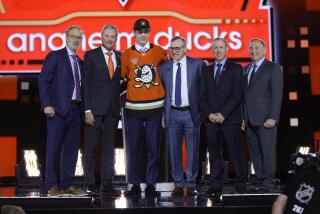Fan Lawsuit Against Yashin Enters New Legal Ground
A Canadian court’s decision to allow a fan’s lawsuit against AWOL Ottawa Senator center Alexei Yashin and Yashin’s agent to proceed may break legal ground.
An Ontario Superior Court judge said last week that Leonard Potechin can continue the $27.5-million suit he filed on behalf of Senator season-ticket holders against Yashin, who has refused to honor the final year of his contract. Yashin, who has been working out with a Swiss team, must file a statement of defense by the end of the month.
Potechin’s attorney, Arthur Cogan, contended that Yashin “deliberately and maliciously interfered with the contract between season-ticket holders and the team.”
Justice Michel Charbonneau acknowledged that law in this area is “relatively undeveloped” and said in his decision: “In recent times, courts have attempted to give monetary damages for the loss of enjoyment or dissatisfaction with the product purchased when the plaintiff has entered into a consumer contract for some sort of entertainment package. The plaintiff here has pleaded such a loss.”
Ted Fikre, the Kings’ general counsel, said he was unfamiliar with the briefs pertaining to the case but added, “It’s creative and I kind of have to applaud the attorney who came up with this.”
Fans angered by lockouts or strikes have previously sued leagues or teams but didn’t get far. This time may be different.
“Based on what I’ve read, the situation the fans and Senators are in is very sympathetic,” Fikre said. “All of us who work for the Kings are certainly sympathetic and have the emotional impulse that you want to get a payback. My instinct is that, to get to the point of liability, you’ve got to have creative legal theories. . . . Interference with a contract is a pretty well established principle of law, but its application here seemed a little bit odd to me.”
Should Potechin prevail, which Fikre deems unlikely, the fallout could be dramatic. The Senators, who will play the Kings on Tuesday at Staples Center and the Mighty Ducks on Wednesday at the Arrowhead Pond, have declined comment on Charbonneau’s ruling. So has the NHL.
“If this were to succeed and there would be some liability, everybody would be very careful with sponsors and season-ticket holders and put in provisions saying there are no promises about the performance of the team,” Fikre said.
“Obviously, it opens a can of worms. It’s certainly interesting and we all have, if nothing else, an emotional interest in this. We’re always concerned with what’s going on with players and salaries. You feel sympathetic to a player or team, but at the same time you don’t want to see a court or judge make a legal precedent that doesn’t make sense.”
WHAT’S IN A NAME?
Remember the playground chant, “Sticks and stones may break my bones but names will never harm me?” Patrice Brisebois of the Canadiens must not have heard it, because he was outraged when Ottawa’s Vaclav Prospal called him “a . . . frog.”
Prospal, a Czech, said he didn’t realize “frog” is a slur, but his use of an alliterative expletive suggests he has a good grasp of English. He apologized to French Canadians but not to Brisebois, with whom he has a long-standing feud.
The NHL ordered Prospal to undergo sensitivity training but didn’t suspend him, sparking an uproar, because in three previous incidents involving slurs against black players, the perpetrators were each suspended for a game. Who decides what’s offensive to whom?
Ideally, everyone would play nice in the sandbox. But there’s big money at stake, and ugly words are said to distract opponents. Swedish players used to be taunted as “chicken Swedes,” and most decided the best response was to prevail on the scoreboard. A thick skin beats a thick head any day.
Prospal shouldn’t have descended to an infantile level, but Brisebois might have been better served by complaining to the NHL Players Assn. If players don’t respect one another, no league-imposed lecture will change that.
DUCKING THE ISSUE
Defense wins championships, especially in the NHL. The Dallas Stars--who last season won 18 games by 1-0, 2-1 or 3-2 and won the Stanley Cup--are proof.
But Duck Coach Craig Hartsburg seems so enslaved by a commitment to defense, he’s wasting the offensive genius of Paul Kariya and Teemu Selanne. He says he’s advocating a team game, not putting defense first. But Kariya and Selanne are the team’s best players--why not build around their talents?
Anyone can learn to play defense, the equalizer in a diluted league. Scoring can’t be taught, and few teams have a Kariya or a Selanne. Why shackle them? Seeing Kariya and Selanne dump and chase is repulsive. They can’t score off the rush or capitalize on their speed and stick handling.
The Stars made Brett Hull be responsible defensively, but they had a deeper, grittier team than the Ducks. When the Ducks don’t get perfect goaltending and fall behind, they have little hope of rallying because they can’t scrap for goals, as the Stars can.
The Ducks’ power play also needs retooling. During one advantage against Florida last week, they had one forward down low, surrounded by four Panthers. The key on the power play is creating an advantage down low to deflect point shots or convert rebounds. Odds of one against four aren’t promising.
In a league that is--thankfully--inching away from defensive drudgery, Hartsburg seems married to defense. But the Ducks aren’t winning on the ice or at the box office.
PATRICK HAT TRICK
This season’s Lester Patrick award for outstanding service to hockey in the U.S. will be shared by a diverse group in Craig Patrick, Mario Lemieux and Lou Vairo.
Patrick, general manager of the Penguins, is the grandson of Lester Patrick, a player, coach and executive in the NHL’s formative years. Lemieux, French Canadian-born and now a U.S. citizen, saved the Penguins as a player and again last year as head of a group that rescued the club from bankruptcy. Vairo, a Brooklyn native, was coach of the 1984 U.S. Olympic team and helped implement the NHL’s task force to bring hockey to inner cities.
Despite their differences, they share a love for the game--and a vision for how emphasizing offense will help it thrive at the NHL level.
Said Lemieux, “To totally give the great players in our game the opportunity to go on the ice and do the things they do in basketball and football and other sports, I think we have to do a better job as a league to protect our star players and promote them like they did in basketball with Michael Jordan and the way they do it in football with the quarterbacks and the receivers.
“They protect the offense and the players that sell their games, and it only makes sense. I think we have to do a better job as owners and GMs and players to realize that. If we do, I think hockey is going to be much better in the future.”
Patrick, who hired Herb Brooks as the Penguin coach because he wanted to maximize the team’s offensive skills, has seen the pendulum swing between defense and offense. He likes the tilt to offense.
“We’re seeing some success with the open type of game we’re playing,” Patrick said. “I think more and more teams are going to that style of play. Certainly the Western Conference has gone to that already. We’re going that way and other teams in the East will probably go that way. . . . I think the game is going in a perfect direction.”
SLAP SHOTS
Nice job by Bryan Lewis, Darren Pang and Bill Clement on ESPN’s “NHL Rules” Sunday. There was no play-by-play, leaving Pang and Clement to analyze plays and inform viewers. They answered some good questions, submitted over the Internet, and explained nuances without condescending, especially in the intermission features on faceoffs and goaltending. Occasionally the screen got too cluttered when graphics popped up to illustrate terms, but it was a worthwhile effort that should be repeated.
Buffalo goalie Dominik Hasek, idled since Oct. 29 because of a torn groin muscle, is skating in forward’s gear but may practice with his goalie gear by the end of this week. . . . Former Blackhawk star Stan Mikita is recovering from surgery to clamp off an artery that threatened to burst above his left eye. His progress is slow but determined.
After saying they need a new arena to survive, the Penguins are considering renovating the Igloo, now known as Mellon Arena. One option is a major project that would force them to move out for a year, but the nearest big arena, under construction at the University of Pittsburgh, will seat about 12,000 and has no plans for an ice surface. The nearest NHL-sized venue is in Cleveland, but Lemieux said he won’t move there temporarily.
Reports from Toronto say Maple Leaf Gardens will be redeveloped as condominiums. The facade will remain because the building has historical status.
More to Read
Go beyond the scoreboard
Get the latest on L.A.'s teams in the daily Sports Report newsletter.
You may occasionally receive promotional content from the Los Angeles Times.







